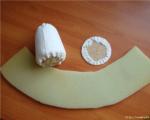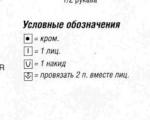Citizenship education. Citizenship education as a pedagogical problem
In every company, a situation may arise in which an absent employee will need to be replaced for some period of time. The need may arise in different situations:
- In case of illness, vacations employee;
- In case of official business trips ;
- In case of suspension from work (for example, the employee did not pass mandatory medical examination and cannot perform work duties);
- When early termination of an employment contract.
To temporarily perform additional duties, the employer has the right to attract full-time employees. In this case, the employee is not released from performing his main job, but additionally performs the duties of an absentee.
The employer must follow a certain procedure to attract an employee to additional work. Before filling out an order to assign additional duties to an employee and demanding the performance of additional work, it is necessary to send the employee a written proposal to perform additional duties in free form. The amount of additional work and the timing of its completion must be agreed upon with the employee.
If the employee agrees, then it is necessary to conclude with him additional agreement to the employment contract. The agreement is filled out in two copies: one copy remains with the employer, and the second is given to the employee. On the employer's copy, the employee must mark the receipt of his copy of the agreement.
It should be noted that there is not always an additional payment for additional work. Thus, the performance of the duties of an absent employee with a similar or similar job function may be provided for in the job description and included in the employee’s job function. In this case, performing additional work will be included in the employee’s job duties and the employer is not required to establish additional payment.
Based on an agreement with the employee, the employer issues an order to assign additional responsibilities to the employee. The document does not have an approved form, so it is drawn up by the employer independently. Let's take a closer look at how to correctly draw up a document and what information needs to be reflected in the order.
Order on the imposition of additional duties (sample)
The header of the document indicates the name of the company, the date it was filled out, and the order number. The main part of the document indicates the reason for assigning additional responsibilities to the employee, indicating the full name of the absent employee, the time period with exact dates (if known) and the reason for his absence. It is advisable to indicate that the assignment of duties occurs with the consent of the employee.
- Full name of the employee who is involved in additional work, his position, time period;
- The position for which the responsibilities are transferred to the employee, job description;
- Will there be an additional payment and the amount of additional payment for performing additional work?
The fact that the employee performed additional work for some time is not reflected in the work book(no need to make any entry about this). IN employee personal card no entries are made either.
Below is a sample order.
It is certainly possible to assign additional responsibilities to an employee that are not provided for in his employment contract.
For example, during the absence of a specialist from the HR department, a secretary or accountant working in the same organization as the temporarily absent employee can hire new employees.
However, the employer does not have the right to unilaterally increase the amount of work by assigning additional responsibilities to the employee.
First, it is necessary to obtain the employee’s consent to perform the functions of an absent colleague. Secondly, document these changes in labor relations.
What are additional responsibilities?
In labor law, the concept of “additional duties” means the performance by an employee, for a fee, of additionally assigned labor functions on an equal basis with his main responsibilities (established in the employment contract) during the working day (Article 60.2 of the Labor Code of the Russian Federation).
There are no restrictions regarding the circle of persons who can be involved in carrying out additional assignments.
The manager has the right to assign additional responsibilities to any subordinate, based on his workload, experience, and professional qualities. The main condition is obtaining written consent from the employee.
Labor related to the performance of functions not provided for in the employment contract is additional and is paid separately.
Selling shoes is one of the interesting business options. – read the link.
A person may be involved in additional work in the following cases:
- Absence from the workplace of a person for whom these duties are the main ones. The list of such cases allowing an employee to be legally absent from the workplace is established by the Labor Code of the Russian Federation. The most common of them are absence due to illness, vacation, or the employee undergoing a medical examination.
In all of these cases, the responsibilities of an absent colleague can be redistributed among working colleagues.
- In case a production task can only be performed by a certain specialist, but this specialty is not included in the staff list. The responsibilities of an absent specialist can be assigned to a specialist who has the necessary skills (combining professions).
- Increasing the volume of work within one profession. The employee is a qualified specialist and during the working day can perform, along with the main job duties, also others, but within the limits of his profession (for example, when staffing is reduced, the responsibilities of one employee can be transferred to another, more qualified one).

Order to assign additional responsibilities to an employee
Any change in working conditions can be made by the employer only after issuing the corresponding order (mandatory order for subordinates to execute).
The order to assign additional duties is issued by the personnel service.
Before issuing an order, the consent of management and the employee who is assigned these responsibilities must be obtained.
The employee’s consent is usually formalized in the form of a bilateral agreement, which must provide a list of responsibilities assigned to the employee, the amount of payment for additional labor, and the validity period of the agreement. The agreement is signed by the employee and the employer.
After registration, the order is given to the employee for review. By signing the order, the employee agrees with its contents and confirms that he has read it.
- Responsibilities assigned. This paragraph must be stated in detail, indicating to what extent and what responsibilities are assigned to the person.
For example:
“Assign the accountant Smolina A.P. performing the duties of a cashier during the working hours established by the employment contract for additional payment.”
- Terms of payment. As a rule, if the duties are performed in full, then the amount of payment is set in the amount of the salary of the absent employee; if labor functions are performed partially, then in proportion to the volume of work performed.
But, in any case, the amount of payment will be established by agreement between the employee and the employer.
“Install Smolina A.P. additional payment for performing the duties of a cashier in the amount of 10,000 rubles.”
- A document base. Link to the number and date of the document assigning additional work to the employee (additional agreement).
- Signature company manager and employee.
If an employee refuses to sign the order, another employee may be nominated to perform the duties.
- Requisites, indicated in individual cases. In cases where the assignment involves combining positions, the assigned position will be additionally indicated.
For example:
“Assign the duties of an engineer to the chief mechanic Rysin O.K.”
Is it possible on your own? Step-by-step instructions and useful tips - follow the link.
#militaryfinance #military economy#army
The organization and conduct of work on saving and rational expenditure of material assets is entrusted to the commander of the military unit, who is obliged to determine the main directions of this work. The implementation of measures for economic work in a military unit is carried out by all officials taking part in the management of military affairs. They must identify the main sources of material and monetary savings. These include:
Identification of equipment, technology and other material assets that are redundant and have no further use, and for the purpose of their rational use - making a decision on transfer to other military units (arsenals, warehouses, storage centers) or on disposal;
- improving the conditions of maintenance and storage of material assets;
- organization of their correct use or operation;
- saving motor resources and bringing their consumption into line with the established fuel consumption limit;
- rational use of repair and maintenance materials, spare parts;
- timely repair of storage facilities and equipment;
- collection and delivery of waste petroleum products for regeneration;
- economical consumption of utilities (electricity and heat, water and fuel);
- automation of outdoor lighting control;
- conversion of heating installations to cheaper types of fuel.
The main economic work activities carried out in clothing service in a military unit can be:
Extending the life of clothing property by improving its operation and careful handling, timely repair, dry cleaning, painting and impregnation with an anti-rot composition, creating (accumulating) stocks of working and replacement uniforms, underwear and bed linen and other clothing property;
- collection and reuse of repair material, rags and accessories when disposing of discarded and deregistered clothing;
- production of discarded property and circulation for planned supply of individual items of clothing, as well as sewing bedside rugs, mattress pads, barracks slippers, mittens, etc.
The food service must also take measures to save material and monetary resources. At the same time, it is necessary to take into account that economic work does not affect the standards for bringing the established ration standards to personnel. The main activities could be:
Saving salt and spices, which are placed on tables in the dining room and replenished as needed;
- collection and timely delivery of packaging without reducing its category;
- sorting potatoes, fermenting and salting vegetables by the personnel of the military unit;
- extending the service life of utensils, mechanical and technological equipment;
- work to prevent the removal of tableware and kitchen utensils from the dining room.
The fuel and lubricants service contains large reserves for saving material assets and money during the operation of weapons, military and special equipment. These include:
Strict adherence to limit discipline in fuel consumption;
- identification and elimination of the causes of fuel burnout by machines and units in excess of established consumption standards;
- proper planning and organization of transportation by road, etc.;
- finding opportunities to connect units that consume fuel to stationary power plants;
- collection and delivery of waste petroleum products for regeneration.
Housing and maintenance support for a military unit involves the use of a significant amount of material assets and the consumption of other resources. Accordingly, it can take measures to save them, in particular:
Use electricity, water, fuel and thermal energy economically, including by automating the control of outdoor lighting, converting heating installations to cheaper types of fuel and other measures taken;
- performance of work by personnel on the repair of buildings and structures, equipment, furniture and other apartment property;
- extension of the service life of apartment property;
- increasing the profitability of hostels and hotels.
Economy and frugality, rational use of material and monetary resources allocated by the state to the Armed Forces of the Russian Federation constitute the main content of economic work carried out in a military unit. Economic work is carried out in all combat and technical support services and branches of the military that conduct military affairs. The main task of economic work in combat and technical services is to ensure measures for the economical and rational use of all types of material assets and other resources allocated for the maintenance and operation of weapons, combat and other equipment, ammunition, and military-technical property.
Economic work in combat and technical support services is carried out with the aim of reducing the labor intensity of maintenance, which includes:
Transition to a one-dimensional maintenance system;
- implementation of recommendations for streamlining its operations, improving accessibility to maintenance and control facilities;
- introduction of on-board diagnostic tools;
- introduction and use of a new progressive organization for the preparation of weapons, military and special equipment for release with complex technical calculations capable of independently performing all types of work in full using the team contract method;
- reduction of costs when storing weapons, military and special equipment;
- monitoring the technical condition of weapons, military and special equipment, its timely diagnostics, determining the feasibility of carrying out maintenance and repair;
- improvement of the spare parts supply system;
- reduction of costs for the maintenance and operation of weapons and military equipment.
In the services of automobile, armored, missile and artillery weapons, as well as engineering, radiation, chemical and biological protection, communications and others, measures are being taken to save material and monetary resources:
Extending the service life between overhauls of weapons, military and special equipment;
- economical use of motor resources of equipment;
- use of simulators for driving training;
- rational use of repair and maintenance materials, spare parts and tools;
- saving spare parts and components due to their restoration and in-house production;
- reduction of water and electricity consumption for technical needs;
- use of discarded and decommissioned tank tarpaulins, tent material and other clothing for the manufacture of automobile awnings and various products for weapons, military and special equipment (covers, etc.);
- increasing the service life of caterpillar tracks, batteries, rubber undercarriages of vehicles, engineering weapons, etc.;
- savings from the reuse of parts and spare parts obtained during dismantling of decommissioned vehicles and equipment when repairing weapons, military and special equipment;
- saving fuel by using rectifier devices for powering communication equipment from the mains and charging batteries.
Good organization of park or park and maintenance days is important in preserving military equipment and maintaining its high combat readiness.
At the facilities of the educational and material base of combat training and educational work, the following activities are possible:
Conservation, proper operation of equipment and repair of educational facilities for combat training and educational work by personnel;
- the use of cheap materials and improvised means for the manufacture of targets and visual aids (stands, posters, etc.);
- reuse of imitation and designation means (signs, flags, headbands, etc.) during field training and exercises;
- advance rational planning, preparation and conduct of exercises with maximum effective use of equipment with minimal expenditure of motor resources, ammunition and fuel;
- increasing the service life between repairs of musical instruments, library books, textbooks, sports equipment, etc.;
- reducing the cost of purchasing books for libraries through periodic redistribution of the library collection between parts.
In order for these activities to be carried out, it is necessary to constantly instill in military personnel a careful attitude towards the use of material and monetary resources, and to increase their responsibility for the economical and rational use of resources. The efficiency of economic work is facilitated by the necessary consideration of the quality of work of military unit officials. However, it should be noted that the entire economic effect in value terms can be shown in reports. If as a result of savings some amounts arise, then this money goes to the state.
One of the components of the economic activity of a military unit is measures to prevent damage to material and monetary assets. The main areas of activity to prevent damage in a military unit are:
Correct determination of limits for the consumption of material assets for each military unit;
- planning of all activities only in accordance with allocated resources;
- compliance with staff discipline;
- appointment of the most trained military personnel to the inventory commissions, systematically conducting instructive classes with them;
- training of commanders in the system of commander training on economy and rational use of material assets;
- fulfillment of the requirements for ensuring the safety of material assets, organization of their storage;
- monthly summing up of activities related to organizing internal control, preventing incidents of damage, eradicating losses and thefts of material assets;
- constant monitoring of the performance by officials of their official duties, monitoring the availability and condition of material assets;
- conducting (if damage is detected) administrative investigations, bringing the perpetrators to justice;
- timely accounting of business transactions.
Therefore, preventing damage can be considered one of the components of economic work. In modern conditions, when it is difficult to materially stimulate the results of economic activity, measures to prevent damage occupy an important place in the organization of military economics. Officials are responsible for ensuring this work. It becomes most effective when monitoring is carried out by commanders and superiors.
Thus, the officials in charge of military affairs are charged with organizing work for the economical, rational use of the material assets of the military unit. During the planning period, the deputy unit commander for logistics (materials and technical support) can develop a plan for savings and rational use of material and monetary resources. On the basis of it, economic work will be carried out in the military unit, the results of which will have to be reflected in the reports of the military unit’s work to save material and monetary resources. A meeting will need to be held at least once a year. At which the results of the economic activities of the units, departments, services and military branches of the unit will be announced.
The leadership of the country and the Ministry of Defense, in the course of implementing the planned measures for the further development of the Armed Forces, have set the task of living within our means. This means that it is necessary to fit within the budgetary allocations that are allocated by the Ministry of Defense of the Russian Federation for the maintenance and implementation of the tasks assigned to them.
The level of combat readiness depends not only on the amount of resources allocated to the country's defense, but also on the efficiency of their use. This goal can be achieved only by observing the strictest savings regime, preventing violations associated with the expenditure of resources, as a result of constantly searching for ways to reduce costs, using methods of military-economic analysis and finding internal reserves in all areas of financial and economic activity. This implies the ever-increasing role of military-economic analysis, which provides the practical activities of leaders at all levels with methods of quantitative analysis and justification of military-economic decisions.
In practice, material, labor and financial resources are used in all processes of economic support of the Armed Forces, that is, in organizing the supply of weapons, military and special equipment, property, combat training, welfare of troops, provision of personnel, industrial production and capital construction. In this regard, financial and economic authorities have the opportunity to influence the adoption of rational decisions, the implementation of which requires the expenditure of material and monetary resources.
Economy regime, organization of economic activity, validity of decisions made, competence, professionalism, economic literacy, knowledge of governing documents and their implementation - these are the principles that should become the norm in the daily activities of all officials, the key to the successful solution of the tasks facing the Armed Forces in general and military management in particular.



